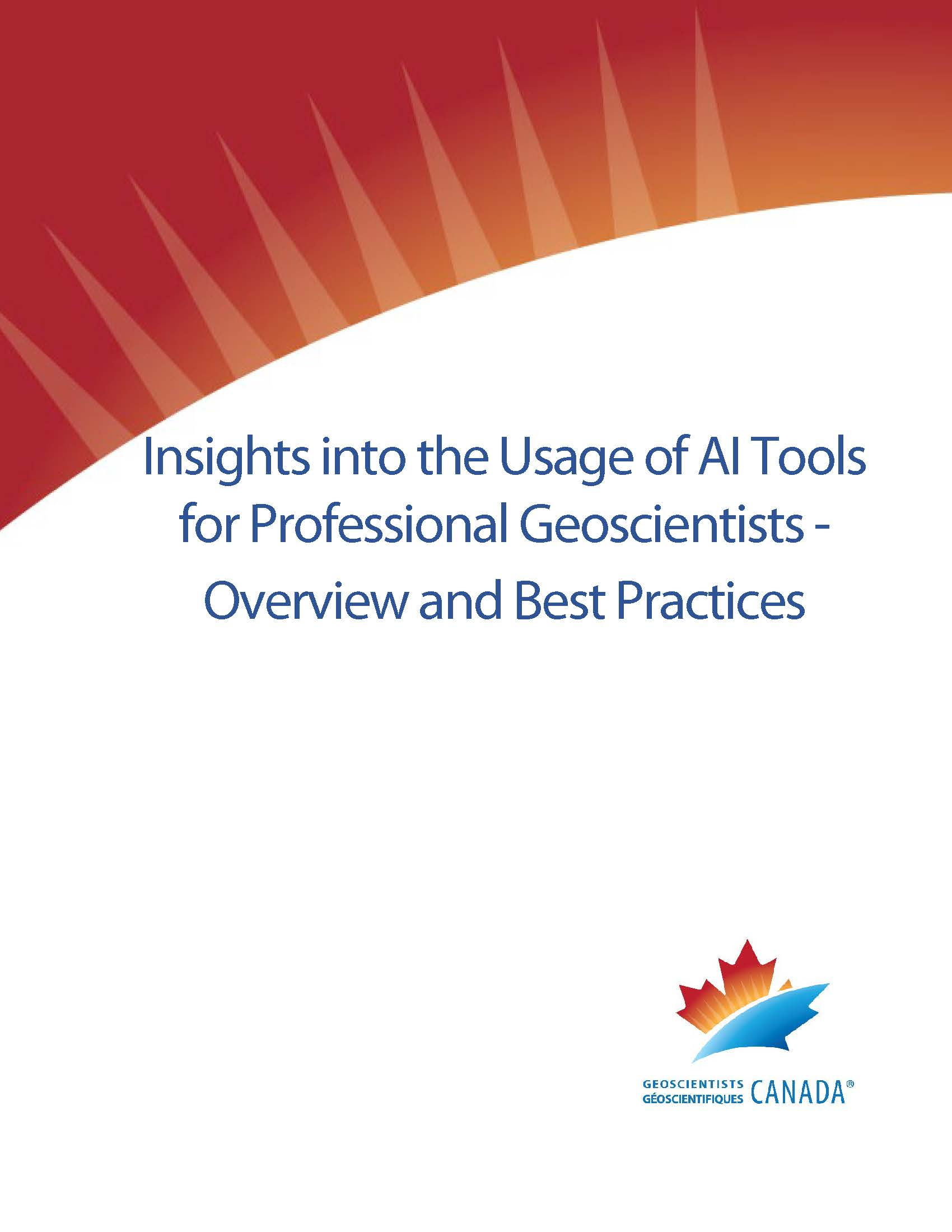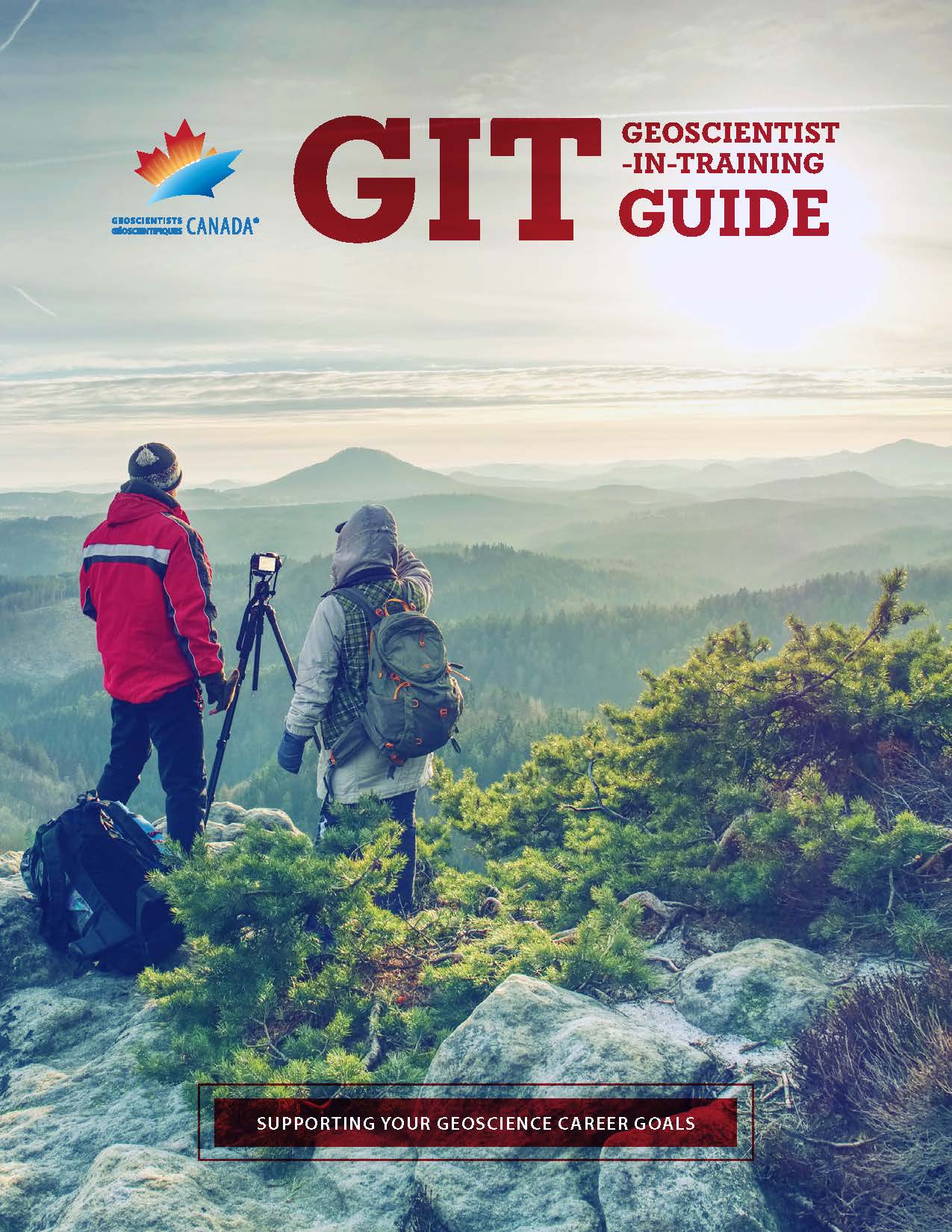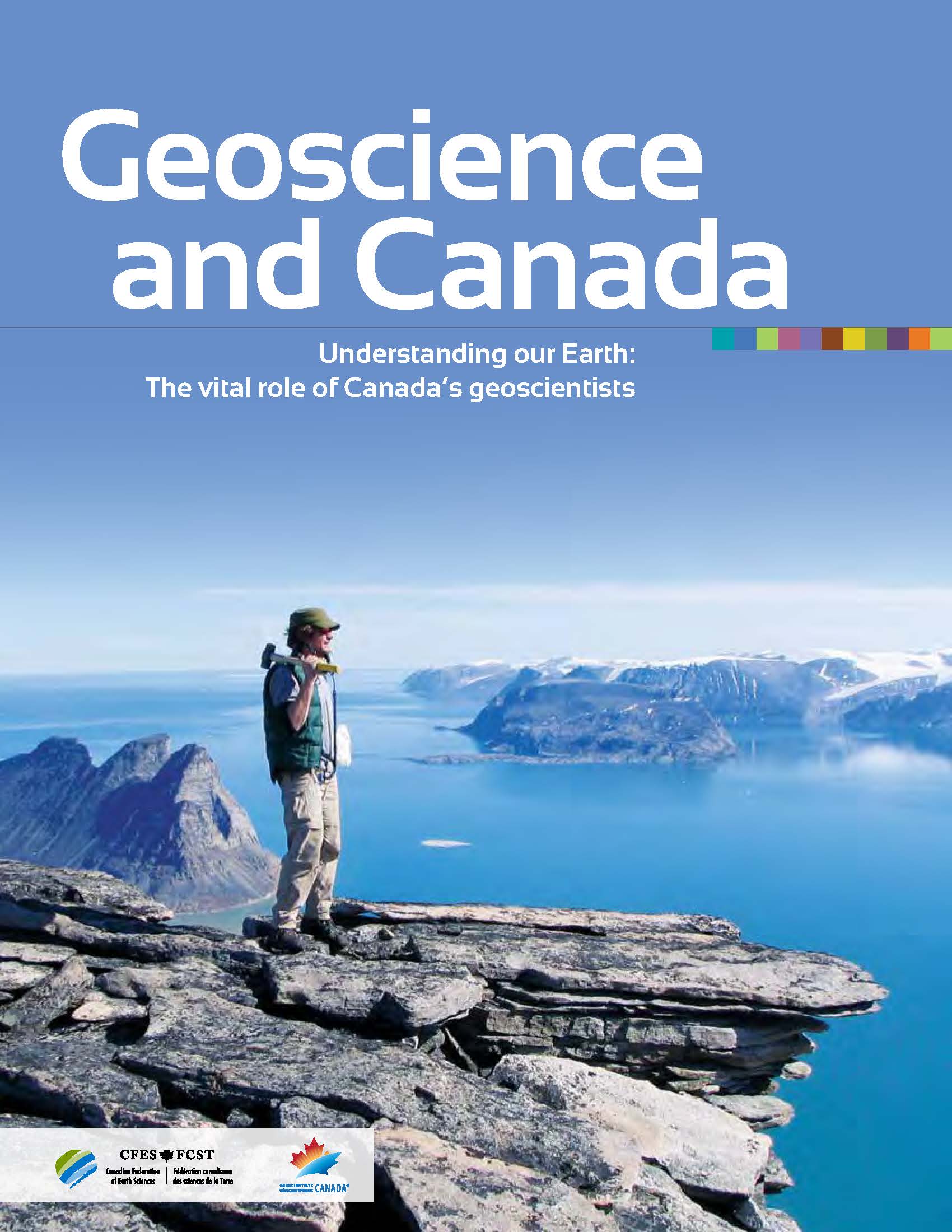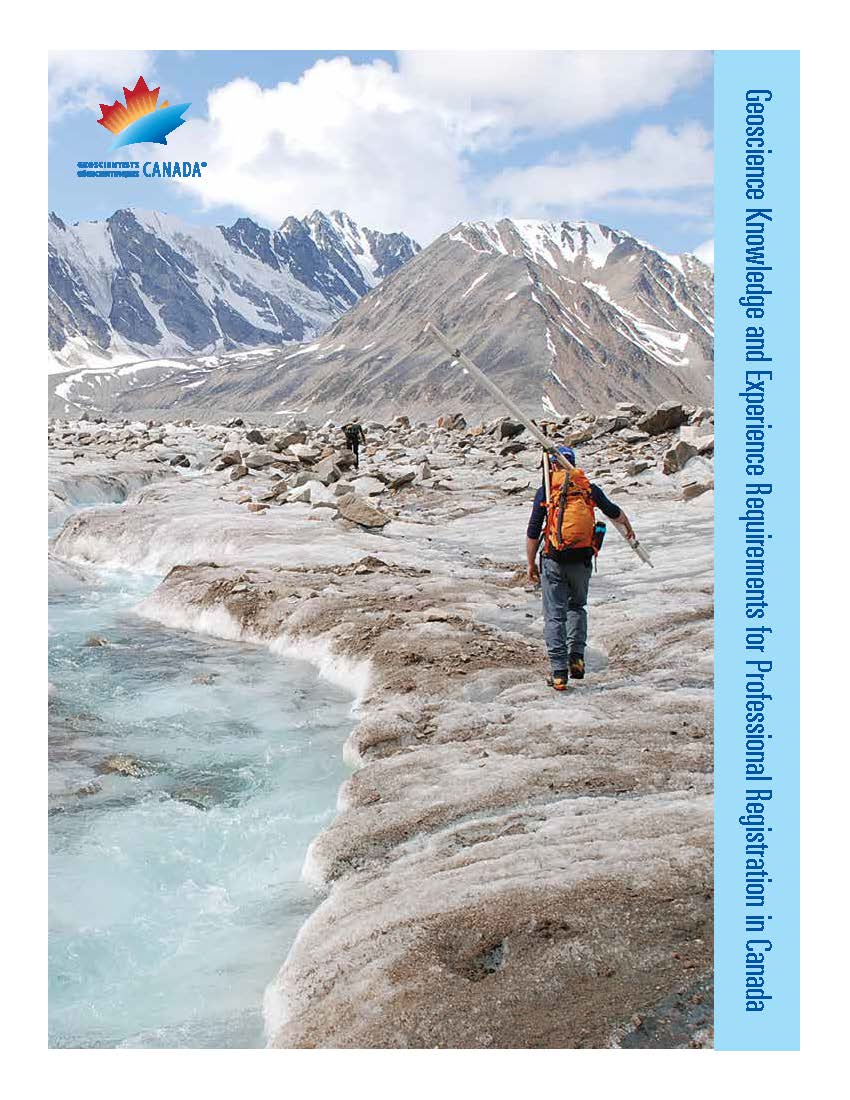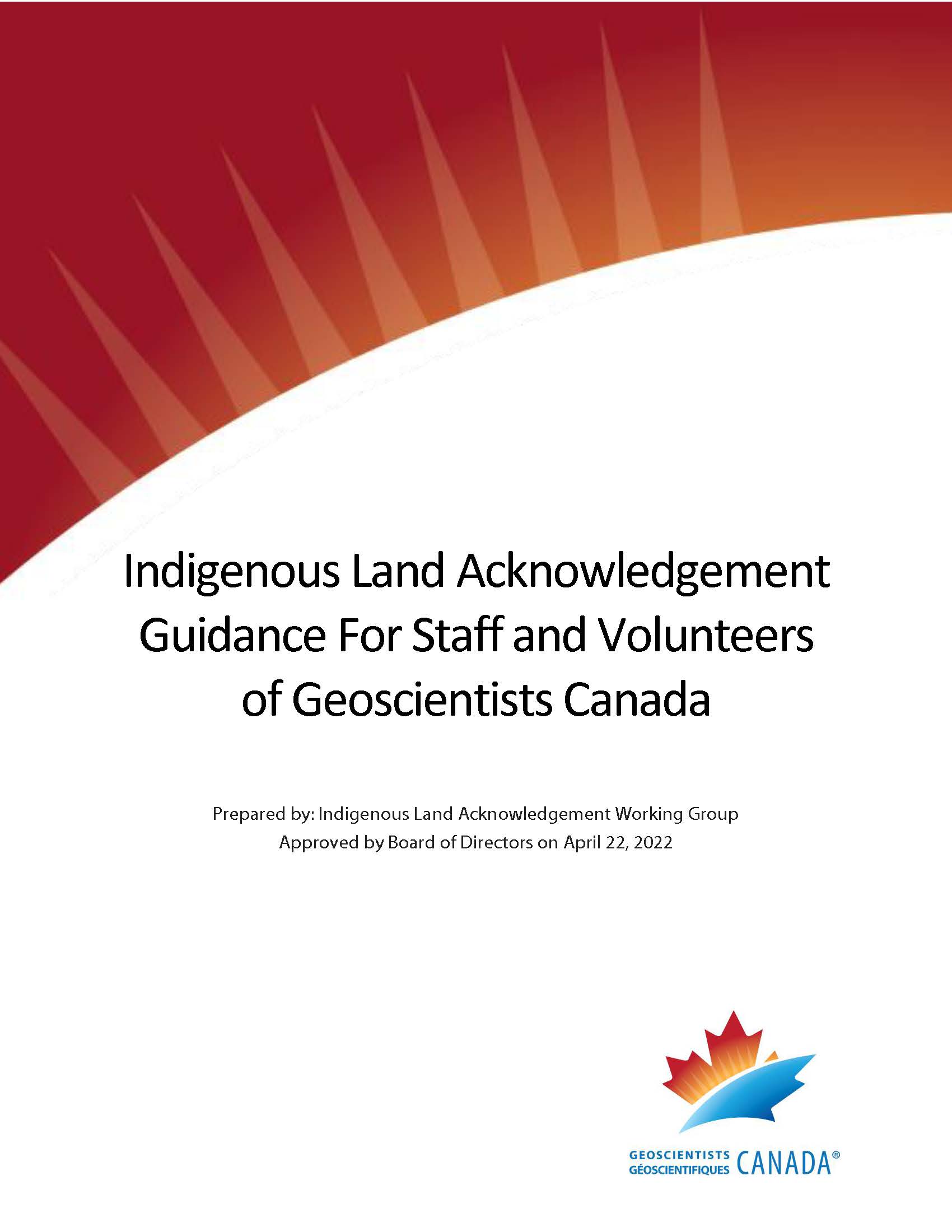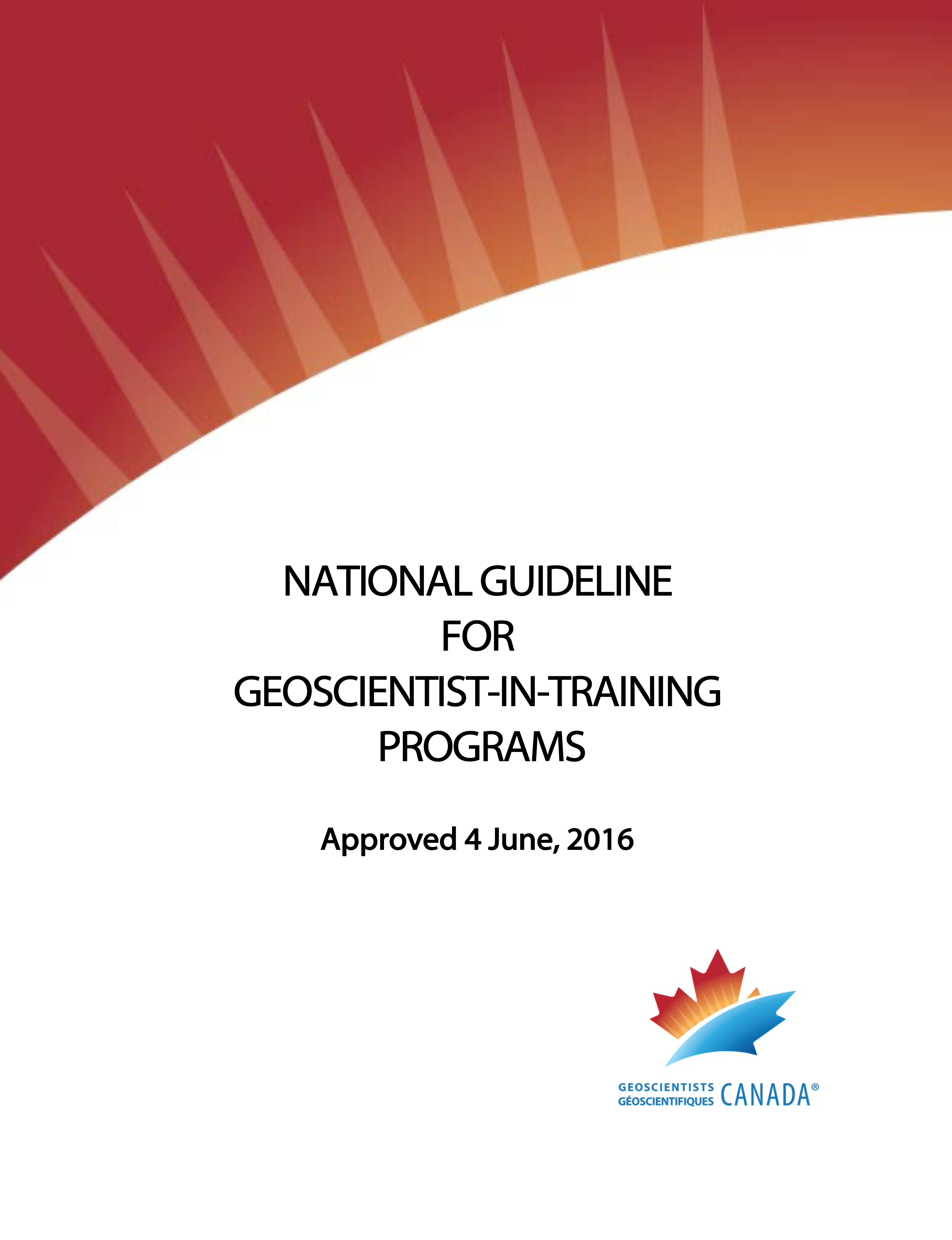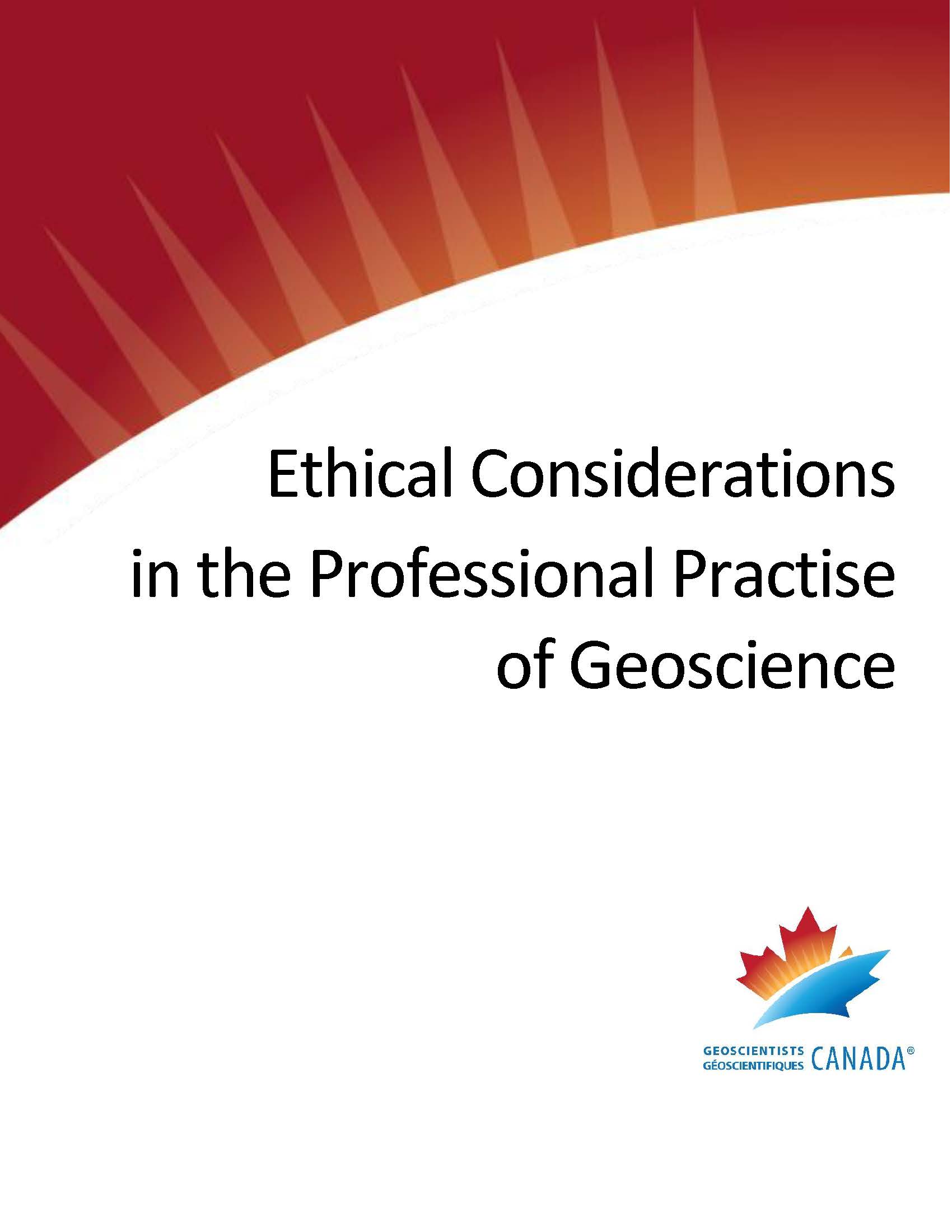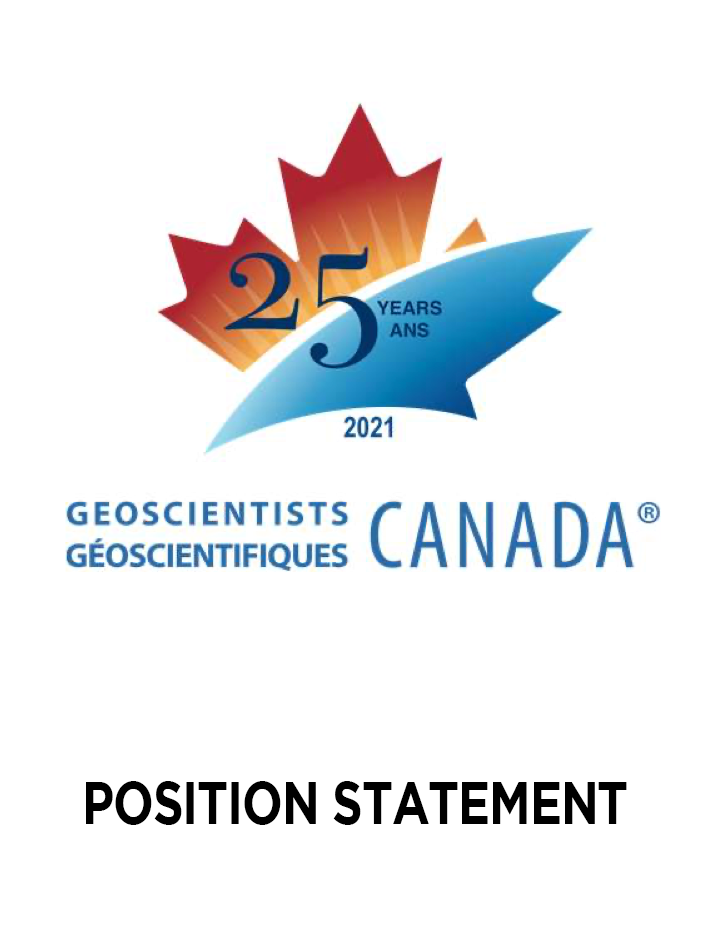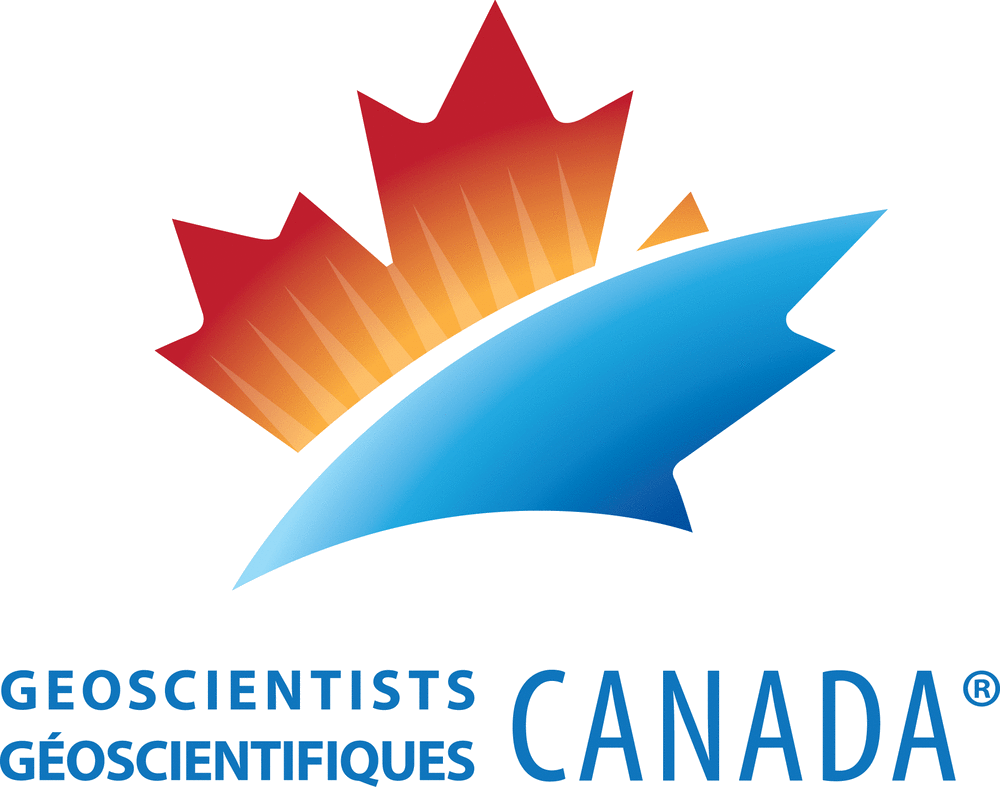Publications & Policy
Publications
a
Insights into the Usage of AI Tools for Professional Geoscientists - Overview and Best Practices
This doscumnt is prepared by the Geoscientists Canada Professional Practice Committee to provide general guidance on the usage of artificial intelligence tools in the practice of professional geoscience. Canada’s geoscience professionals should consult the regulators’ related geoscience acts, regulations, bylaws, standards, and guidelines for the relevant requirements applicable to the professional’s activities within the jurisdiction of their work.
GIT Program Information Guide
A Canadian geoscience regulator Geoscientist-In-Training Program can help you while you’re accumulating the required work experience to complete your professional qualifications. As a Geoscientist-In-Training (GIT), current and prospective employers will know that you are academically qualified and on the path to becoming a P.Geo.
Geoscience and Canada – Understanding Our Earth: The vital role of Canada’s geoscientists
Geoscience is the study of the structure and history of our planet and its natural systems. Human life and progress are underpinned by materials provided by the Earth and geoscience provides us with the knowledge and understanding to find resources and utilise the Earth sustainably, for the benefit of current and future generations. The Earth is changing through natural processes and human actions. This booklet explores how Canadian geoscientists recognise, document, and interpret these processes and changes, particularly the gradual changes that take place over thousands to millions of years, as they help society find and manage Earth’s resources for the present and future.
Geoscience Knowledge and Experience Requirements for Professional Registration in Canada (GKE)
This document is a summary of what has been agreed to across the profession and among the regulators within Canada, concerning requirements for new applicants seeking registration in any one of the provinces or territories for the first time.
Policy & Statements
a
Geoscience Practice Guidelines Catalogue
Guidelines are documents that outline general guiding principles addressing a single subject relevant to the practice of geoscience in Canada.
The following is a searchable list of guidelines developed by the provincial and territorial geoscience practice regulators in Canada, Geoscientists Canada, and other organizations that may provide additional guidance or assistance. For questions or additional information, please contact your local regulator or the appropriate guideline author.
This list will be updated annually. Please check your regulator’s website for current guidance documents.
| Authoring Organization | Title | Year Published |
Category |
|---|---|---|---|
| Association of Professional Engineers and Geoscientists of Alberta (APEGA) | Practice Standard | Authenticating Professional Work Products | 2022 | Authentication |
| Association of Professional Engineers and Geoscientists of Alberta (APEGA) | Concepts of Professionalism | 2004 | Professionalism |
| Association of Professional Engineers and Geoscientists of Alberta (APEGA) | Professional Practice Standard |Continuing Professional Development | 2025 | CPD |
| Association of Professional Engineers and Geoscientists of Alberta (APEGA) | Joint Practice Standard | Professional Responsibilities in Completion and Assurance of Reclamation and remediation Work in Alberta | 2012 | Environmental |
| Association of Professional Engineers and Geoscientists of Alberta (APEGA) | Use of Geophysical Instruments in Near-Surface Investigations | 2008 | Geophysics |
| Association of Professional Engineers and Geoscientists of Alberta (APEGA) | Considerations for Establishing a Consulting Practice | 2005 | Professional Practice |
| Association of Professional Engineers and Geoscientists of Alberta (APEGA) | Contract Employees and Independent Contractors | 2007 | Professional Practice |
| Association of Professional Engineers and Geoscientists of Alberta (APEGA) | Environmental Practice | 2004 | Environmental |
| Association of Professional Engineers and Geoscientists of Alberta (APEGA) | Ethical Use of Geophysical Data | 2010 | Ethics |
| Association of Professional Engineers and Geoscientists of Alberta (APEGA) | Management of Risk in Professional Practice | 2006 | Professional Practice |
| Association of Professional Engineers and Geoscientists of Alberta (APEGA) | Professional Member as a Witness | 2003 | Professional Practice |
| Association of Professional Engineers and Geoscientists of Alberta (APEGA) | Guideline for Professional Practice | 2013 | Professional Practice |
| Association of Professional Engineers and Geoscientists of Alberta (APEGA) | Professional Responsibilities in Developing Software | 2006 | Software |
| Association of Professional Engineers and Geoscientists of Alberta (APEGA) | Practice Standard |Relying on the Work of Others and Outsourcing | 2021 | Professional Practice |
| Association of Professional Engineers and Geoscientists of Alberta (APEGA) | Selecting Engineering and Geoscience Consultants | 2022 | Professional Practice |
| Association of Professional Engineers and Geoscientists of Alberta (APEGA) | Ethical Practice | 2022 | Ethics |
| Association of Professional Engineers and Geoscientists of Alberta (APEGA) | Practice Standard |Professional Practice Management Plan | 2022 | Professional Practice |
| Association of Professional Engineers and Geoscientists of Alberta (APEGA) | Practice Bulletin | Clarifying Authentication Requirements for Drilling and Completions | 2021 | Authentication |
| Association of Professional Engineers and Geoscientists of Alberta (APEGA) | Field Reviews of Engineering and Geoscience Work | 2022 | Professional Practice |
| Association of Professional Engineers and Geoscientists of Alberta (APEGA) | Joint Practice Standard |Professional Responsibilities in Completion and Assurance of Wetland Science, Design and Engineering Work in Alberta | 2017 | Environmental |
| Association of Professional Engineers and Geoscientists of Alberta (APEGA) | Practice Bulletin | Authentication Requirements for As-Built, Record, and As-Acquired Drawings | 2023 | Authentication |
| Association of Professional Engineers and Geoscientists of Alberta (APEGA) | Personal Annual Competency Evaluation | 2025 | Professional Practice |
| Association of Professional Engineers and Geoscientists of Saskatchewan (APEGS) | Authentication of Documents: Use of Professional Seals | 2023 | Authentication |
| Association of Professional Engineers and Geoscientists of Saskatchewan (APEGS) | Continuing Professional Development Program | 2024 | CPD |
| Association of Professional Engineers and Geoscientists of Saskatchewan (APEGS) | The APEGS Investigation and Discipline Process | 2013 | Professional Practice |
| Canadian Institute of Mining, Metallurgy and Petroleum (CIM) | CIM Definition Standards on Mineral Resources and Reserves (CIM Definition Standards) | 2014 | Minerals |
| Canadian Institute of Mining, Metallurgy and Petroleum (CIM) | CIM Estimation of Mineral Resources & Mineral Reserves Best Practice Guidelines | 2019 | Minerals |
| Canadian Securities Administrators (CSA) | National Instrument 43-101 - Standards of Disclosure for Mineral Projects | 2016 | Minerals |
| Canadian Securities Administrators (CSA) | National Instrument 51-101 Standards of Disclosure for Oil and Gas Activities | 2015 | Pterloeum |
| Engineers and Geoscientists British Columbia (EGBC) | Flood Mapping in BC | 2017 | Environmental |
| Engineers and Geoscientists British Columbia (EGBC) | Expert Witness | 2016 | Professional Practice |
| Engineers and Geoscientists British Columbia (EGBC) | Equity, Diversity, and Inclusion | 2021 | Ethics |
| Engineers and Geoscientists British Columbia (EGBC) | Sustainability Guidelines | 2023 | Professional Practice |
| Engineers and Geoscientists British Columbia (EGBC) | Guidelines on Intellectual Property | 2009 | Professional Practice |
| Engineers and Geoscientists British Columbia (EGBC) | Assessment of Groundwater at Risk of Containing Pathogens (GARP) | 2019 | Environmental |
| Engineers and Geoscientists British Columbia (EGBC) | Watershed Assessment and Management of Hydrologic and Geomorphic Risk in the Forest Sector | 2020 | Environmental |
| Engineers and Geoscientists British Columbia (EGBC) | Guidelines for Professional Services in the Forest Sector - Forest Roads | 2012 | Environmental |
| Engineers and Geoscientists British Columbia (EGBC) | Professional Services in the Forest Sector - Terrain Stability Assessments | 2010 | Environmental |
| Engineers and Geoscientists British Columbia (EGBC) | Guidelines for Management of Terrain Stability in the Forest Sector | 2008 | Environmental |
| Engineers and Geoscientists British Columbia (EGBC) | Legislated Flood Assessments in a Changing Climate in BC | 2018 | Environmental |
| Engineers and Geoscientists British Columbia (EGBC) | Landslide Assessments in British Columbia | 2023 | Environmental |
| Engineers and Geoscientists British Columbia (EGBC) | Professional Services in the Forest Sector - Crossings | 2021 | Environmental |
| Engineers and Geoscientists British Columbia (EGBC) | Flowing Artesian Wells and Excavations | 2022 | Environmental |
| Engineers and Geoscientists British Columbia (EGBC) | Relying on the Work of a Specialist | 2023 | Professional Practice |
| Engineers and Geoscientists British Columbia (EGBC) | Contractual Provisions Regarding Retention and Disclosure of Project Documentation | 2023 | Professional Practice |
| Engineers and Geoscientists British Columbia (EGBC) | Professional Roles and Responsibilities for the Life Cycle of Forest Road Crossings | 2019 | Environmental |
| Engineers and Geoscientists British Columbia (EGBC) | Local Government Asset Management | 2021 | Professional Practice |
| Engineers and Geoscientists British Columbia (EGBC) | Professional Roles and Responsibilities for the Life Cycle of Forest Roads | 2022 | Professional Practice |
| Engineers and Geoscientists British Columbia (EGBC) | Erosion and Sediment Control | 2024 | Professional Practice |
| Engineers and Geoscientists British Columbia (EGBC) | Preparartion of One Water System Risk Management in BC | 2024 | Professional Practice |
| Engineers and Geoscientists British Columbia (EGBC) | Peer Review | 2022 | Professional Practice |
| Engineers and Geoscientists British Columbia (EGBC) | Use and Development of Seismic Microzonation Maps in BC | 2024 | Professional Practice |
| Engineers and Geoscientists British Columbia (EGBC) | Landslide Mapping | 2025 | Environmental |
| Engineers and Geoscientists British Columbia (EGBC) | Diamond Drill Core Logging: Structure | 2025 | Professional Practice |
| Engineers and Geoscientists New Brunswick (APEGNB) | Guideline for Use of Professional Seal | 2019 | Authentication |
| Engineers and Geoscientists New Brunswick (APEGNB) | Continuing Professional Development Requirements for New Brunswick | 2024 | CPD |
| Engineers Canada | Public Guideline on Good Character | 2013 | Ethics |
| Engineers Canada | Guideline for Mentoring Programs | 2012 | Professional Practice |
| Engineers Canada | Public guideline on assuming responsibility for the work of engineers-in-training | 2016 | Professional Practice |
| Engineers Canada | National guideline on sustainable development and environmental stewardship for professional engineers | 2016 | Environmental |
| Engineers Canada | Public guideline on site remediation for engineers | 2018 | Environmental |
| Engineers Canada | Step-by-step guide for the preparation and implementation of an individual continuing professional development plan | 2008 | CPD |
| Engineers Canada | Public guideline on site remediation for engineers | 2018 | Environmental |
| Engineers Canada | Principles of Climate Change Adaptation for Engineers | no date | Climate Change |
| Engineers Geoscientists Manitoba (EGM) | Professional Development Program Guide | 2020 | CPD |
| Engineers Geoscientists Manitoba (EGM) | Authentification of Hardcopy and Electronic Professional Documents Guideline | 2019 | Authentication |
| Engineers Geoscientists Manitoba (EGM) | Policy on Identification on Work Product and Company Titles | 2019 | Authentication |
| Engineers Geoscientists Manitoba (EGM) | Return to Active Practice | 2019 | Professional Practice |
| Engineers Geoscientists Manitoba (EGM) | Environment & Sustainability Guideline | 2022 | Environmental |
| Engineers Geoscientists Manitoba (EGM) | Expert Witness Guideline | 2022 | Professional Practice |
| Engineers Geoscientists Manitoba (EGM) | Conflict of Interest Guideline | 2022 | Professional Practice |
| Engineers Geoscientists Manitoba (EGM) | Professional Development Program Guide | 2022 | CPD |
| Engineers Geoscientists Manitoba (EGM) | Good Character Guideline | 2022 | Professional Practice |
| Engineers Nova Scotia | Professional Practice Guidelines (formerly called Manual of Professional Practice) | 2016 | Professional Practice |
| Engineers Nova Scotia | Guideline for Use of the Professional Seal | 2016 | Authentication |
| Engineers Nova Scotia | Practice Review Guidelines | 2016 | Professional Practice |
| Geoscientists Canada | Geoscience Knowledge and Experience Requirements for Professional Registration in Canada | 2019 | Professional Practice |
| Geoscientists Canada | Framework for Assessment in the Licensing of Professional Geoscientists in Canada | 2020 | Professional Practice |
| Geoscientists Canada | Competency Profile for Professional Geoscientists at Entry to Practice | 2014 | Professional Practice |
| Geoscientists Canada | National Guideline for Geoscientist-in-Training Programs | 2016 | Geoscientist in Training |
| Geoscientists Canada | Geoscientist-in-Training Program Information Guide | 2017 | Geoscientist in Training |
| Geoscientists Canada | Managing Transitions: Before, During and After Leave - A Planning Resource Guide for Employees and Employers | 2010 | Human Resources |
| Geoscientists Canada | Ethical Considerations in the Professional Practise of Geoscience | 2022 | Ethics |
| Geoscientists Canada | Indigenous Land Acknowledgement Guidance For Staff and Volunteers of Geoscientists Canada | 2022 | Indigenous |
| Geoscientists Nova Scotia (APGNS) | Geoscience Professional Practice Guideline for Conducting Phase 1 and Phase 2 Environmental Site Assessments in Nova Scotia | 2014 | Environmental |
| Geoscientists Nova Scotia (APGNS) | Continuing Professional Development and Competency Assurance Program Guide | 2022 | CPD |
| Geoscientists Nova Scotia (APGNS) | Guidelines for the use of the Stamp of the Association of Professional Geoscientists of Nova Scotia | 2021 | Authentication |
| Northwest Territories and Nunavut Association of Professional Engineers and Geoscientists (NAPEG) | Authentication of Documents/Use of Professional Stamps | 2012 | Authentication |
| Northwest Territories and Nunavut Association of Professional Engineers and Geoscientists (NAPEG) | Continuing Professional Development Program | 2016 | CPD |
| Northwest Territories and Nunavut Association of Professional Engineers and Geoscientists (NAPEG) | Permit to Practice | no date | Professional Practice |
| Northwest Territories and Nunavut Association of Professional Engineers and Geoscientists (NAPEG) | A guideline for A Structured Program for Members-in-Training | 2010 | Geoscientist in Training |
| Professional Engineers & Geoscientists Newfoundland & Labrador (PEGNL) | Guideline for Preparation of Engineering and Geoscience Drawings and Technical Specifications | 2020 | Professional Practice |
| Professional Engineers & Geoscientists Newfoundland & Labrador (PEGNL) | Environmental Stewardship & Sustainable Development Guideline for Professional Engineers and Geoscientists | 2022 | Environmental |
| Professional Engineers & Geoscientists Newfoundland & Labrador (PEGNL) | Guideline for the Authentication of Professional Documents | 2021 | Authentication |
| Professional Engineers & Geoscientists Newfoundland & Labrador (PEGNL) | Guideline for the Provision of Engineering Services for Facilities | 2021 | Professional Practice |
| Professional Engineers & Geoscientists Newfoundland & Labrador (PEGNL) | Continuing Professional Development Requirements for Engineers and Geoscientists | 2024 | CPD |
| Professional Engineers & Geoscientists Newfoundland & Labrador (PEGNL) | Guideline for Permit Holders and Companies Employing Engineers and Geoscientists | 2021 | Professional Practice |
| Professional Engineers & Geoscientists Newfoundland & Labrador (PEGNL) | Discipline Handbook | 2022 | Professional Practice |
| Professional Engineers & Geoscientists Newfoundland & Labrador (PEGNL) | Practice Guideline for the Design of Formwork and Falsework by Professional Members | 2022 | Professional Practice |
| Professional Engineers & Geoscientists Newfoundland & Labrador (PEGNL) | Practice Guideline for Areas of Practice Spanning Engineering and Geoscience | 2023 | Professional Practice |
| Professional Engineers Ontario (PEO) | Guideline on Human Rights in Professional Practice | 2009 | Ethics |
| Professional Engineers Ontario (PEO) | Professional Engineers Reviewing Work Prepared by Another Professional Engineer | 2011 | Professional Practice |
| Professional Engineers Ontario (PEO) | Conducting a Practice Review | 2014 | Professional Practice |
| Professional Engineers Ontario (PEO) | Use of Professional Engineer's seal | 2008 | Authentication |
| Professional Engineers Ontario (PEO) | The Professional Engineer as an Expert Witness | 2011 | Professional Practice |
| Professional Engineers Ontario (PEO) | Forensic Engineering Investigations | 2016 | Professional Practice |
| Professional Engineers Ontario (PEO) | Guideline Professional Engineers Providing Services in Environmental Site Assessment, Remediation and Management | 1996 | Environmental |
| Professional Engineers Ontario (PEO) | Guideline Professional Engineers Providing Geotechnical Engineering Services | 1993 | Professional Practice |
| Professional Engineers Ontario (PEO) | Guideline Professional Engineers Providing Reports on Mineral Properties | 2002 | Minerals |
| Professional Geoscientists Ontario (PGO) | General Professional Practice Guidelines For Economic Geologists | 2021 | Minerals |
| Professional Geoscientists Ontario (PGO) | Professional Practice Guidelines for advertising and use of the PGO identification and logo | 2019 | Advertising |
| Professional Geoscientists Ontario (PGO) | General Professional Practice Guidelines for Geophysicists | 2024 | Geophysical |
| Professional Geoscientists Ontario (PGO) | PGO Guidance on Document Authentication February 2025 | 2025 | Authentication |
| Professional Geoscientists Ontario (PGO) | Continuing Professional Development (CPD) Program Requirements: Guidelines for Practising and Limited Members | 2024 | CPD |
| Professional Geoscientists Ontario (PGO) | Professional Geoscientists Reviewing Work Prepared by Another Professional Geoscientist | 2019 | Professional Pratice |
| Professional Geoscientists Ontario (PGO) | Professional Practice Guidelines for Geomorphologists | 2021 | Professional Practice |
| Professional Geoscientists Ontario (PGO) | Equity, Diversity, and Inclusion Professional Practice Guidelines | 2023 | Professional Practice |
| Professional Geoscientists Ontario (PGO) | PGO Guideline on Professional Geoscientists Reviewing Work Prepared By Another Geoscientist | 2024 | Professional Practice |
| Society of Petroleum Evaluation Engineers (SPEE) | The Canadian Oil and Gas Evaluation Handbook (COGE Handbook) | 2019 | Petroleum |
